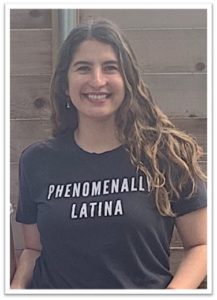The following post is written by Chelsea Cornejo, a Bilinguistics team member. We share her sentiments with gratitude for the narrative she brings to our professional and human community.
Latinx Perspective
 I am Mexican-American. Spanish was my first language, and I learned English when I was around 4 years old. I was born in Los Angeles, California and was surrounded by others who spoke Spanish and looked like me. Then, things changed. I moved to Texas to a city where no one looked like me, and I began to feel differently. I felt shame for how I looked, the language I spoke, our way of life. Growing up, people said unkind, racist things to me.
I am Mexican-American. Spanish was my first language, and I learned English when I was around 4 years old. I was born in Los Angeles, California and was surrounded by others who spoke Spanish and looked like me. Then, things changed. I moved to Texas to a city where no one looked like me, and I began to feel differently. I felt shame for how I looked, the language I spoke, our way of life. Growing up, people said unkind, racist things to me.
These last few years, however, this shame has turned into anger. From the moment my people were called drug dealers and rapists, I have not been okay. I am mad. Before continuing, I recognize that I live with a lot of privilege, a special right, advantage, or immunity granted or available only to a particular person or group. I have fair skin and can be “white-passing,” which is a privilege within the Mexican and American community. I have socio-economic, educational, and citizenship privilege.
I recognize that my struggles are not the struggles that many in my community face. I do not live with the constant fear that my family can be taken away. I do not live with fear that my rights will be violated. I do not live in fear about going to the doctor for fear that I will be deported. So please know that although I am speaking as a member of the Latinx community, this is my story and is not representative of all within our community. There are many other voices and stories that also deserve to be heard. The fear that I share with other minorities, especially at this moment (and for some communities, a fear that has always been felt), is that I, my husband, our families could be targeted simply because of the way that we look, the language that we speak, or the country we come from. My heart aches for all of us that live with this fear.
Here’s why this matters
Our students, clients, and families come from different backgrounds. We do not often know their life situation or what they might be dealing with at home. At the beginning of this year, I helped translate for one of my student’s parents who was doing (what felt like endless amounts of) paperwork to enroll their child in an after school program. We spent almost three hours together. At the end of our time, this parent trusted me enough to share that she was struggling to feed her children. She was a single mother who relied on food stamps. Because of recent legislation, she, and many of her friends, was worried about re-applying for government aid because it could affect them in the future when they applied for citizenship. My heart ached for this family, and I felt helpless.
Our families are often dealing with a lot at home. We need to be conscious of this as we work with them. Our students may come to us hungry, they may come to us without background knowledge of certain vocabulary/themes, and they may come to us with anxious thoughts. It is our job to meet them where they are.
Here’s what we can do
I have struggled for three years about my place in this fight; how can I help? Donating is wonderful, but there are still kids in cages. Volunteering is wonderful, but we are still targets of terrorist attacks. What can I do? What I have decided is that donating, volunteering, posting on social media, and VOTING are part of our work.
However, one of the most important things I can do in my day-to-day is to show up and provide a safe space for my students and clients. I can check in with them at the beginning of each session. Sometimes, this means that we spend more time talking about our emotions than we do working on /k/ and /g/. Providing a safe space for parents includes ensuring that we always provide them informed consent. We explain reports, IEPs, and legal processes in a parent-friendly manner. When we do not speak their native language, we provide knowledgeable interpreters that also explain the legal jargon in a parent-friendly manner.
This also means calling parents after the IEP meeting and making sure they understood what was said during the information-loaded and daunting meetings. We must also honor and celebrate our students’ and families’ cultures. This means reading books, watching videos, and having discussions about Dia de los Muertos (Day of the Dead), Día de los Reyes (Three King’s Day) and Las Posadas during Christmas.. Keep in mind that these discussions go beyond food and dress. We also go into tradition and what makes each holiday meaningful. We honor each student and each family for who they are. In a recent trailer for In the Heights, Abuela Claudia, the grandmother in the story states, “We have to assert our dignity in small ways. Little details that tell the world that we are not invisible.”
SLPs, let us help our students and families assert their dignity and make them feel seen and known.




You addressed so many different issues that need to be talked about. I am also a bilingual slp & your words are such a great reminder to take more time & give them space, to go out of my way to allow them to feel safe & be educated. Your perspective is valued & thank you for sharing! Muchas gracias.
Thank you so much for your kind words, Brittney. I am thankful there are SLPs like you. Your students are so lucky to have you!
Thank you so much for writing this. Representation is extremely important in our field, and it is devestating that we have to deal with racism. I myself as an SLP feel underrepresented and to read your article, it makes me glad we’re trying to push for having open discussions about race and privilege. #latinapower#weneedMORErepresentation
I absolutely agree with you. I think we need to continue having this conversation about race and privilege and how we can amplify and support one another. And AMEN to the need for more representation. I think we deserve to feel represented, as do our families and students.
You make me proud Latina! Represent!!!!!!!!! Everyday!!!!!
We are phenomenally Latina!
I am so very glad these perspectives are shared. This is a wonderful article and reinforces that our roles as SLPs goes beyond just providing therpeutic services.
Yes, I think we have such a special position in the lives of our students/clients. As Phuong often says, “to get to the head, you go through the heart.”
The credit goes to Dr.Jeffrey Duncan-Andrade. He work surely aligns with your sentiments, Chelsea.
Thanks so much for writing this beautiful piece. ? I’m going to be thinking about that quote all day.
Thank you for your kind words. I will be thinking of your encouragement all weekend <3
Well done!
Thank you! I appreciate you reading the blog post and sending kind words.
Thank you for writing an article that speaks to the reality of what students are experiencing outside of academics. It was great that you addressed to remember to think about parents that have other struggles that are very real and take precedence over filling out a parent input form or returning a meeting request. I do think the human connection is what will help bridge differences and set a foundation for support. I agree 100% that taking time before a session to talk to students about their lives, their day, and their feelings is crucial. Thanks for writing this article I kept screaming in my head “YES YES YES!!!”
I agree completely with everything you said. What a great reminder that you gave to offer grace and kindness to our parents when we are having trouble getting forms back, setting up meetings, etc. And YES to human connection. It is important for their hearts and our own. Thank you for taking the time to read and respond with such kindness and insight.
Thank you, thank you, thank you. This should be published in the ASHA Leader.
I am also a member of the LatinX community. And I am the only Spanish speaking, school-based SLP in my whole state! While many people call me for my services during evaluations and treatment, not everyone understands how the current environment affects our students’ overall wellbeing. It goes so beyond language, food, and clothing.
I have a lot of the same privileges that you do. However, having been born in a foreign country, I also know how nerve-wracking the immigration process can be, even when you have all the legal documentation that the US requires.
We need to continue to have these conversations. And we need more white colleagues to become our allies. Latinx and other POC cannot be the only ones speaking up. It leaves us vulnerable. Keep up the good work.
Wow. I cannot imagine being the only bilingual SLP in the whole state. You are so very important for your students, peers, and staff. I agree that the current climate absolutely affects our students— I know it has affected me.
I agree that we need to continue to have these discussions that involve everyone including allies. We need allies to listen and to help amplify our voices.
I appreciate the perspective that you bring as a Spanish speaking, Latina immigrant. Thank YOU for taking the time to respond with such a wonderful and needed perspective.
I so appreciate your honest shared experiences of growing up Latina in this country and providing services to families of Latino background. I am not Latina but have been blessed and challenged to use Spanish in the capacity of bilingual speech pathology for over 30 years. In addition, I married an immigrant who speaks Arabic as a first language and raised with him two culturally diverse sons in this country. It has not been an easy road professionally or personally but I would do it all again. It has made me a better person. After retiring, I went on to contract at a bilingual school one day a week and to teach Spanish to seniors because of my belief that working cross-culturally has changed me for the better. I love the children. I am passionate about improving their communication. Greeting and using a language other than English with culturally diverse individuals is a joy both for me and them. And yes, I begin each session with sharing time because it is emotionally intelligent. Be kind. Be self aware. Be blessed.
I agree – this should appear in ASHA Leader!!
Thank you for this article! Good points about emotionally checking in. You said you learned English when you were 4 years old – can I ask you if you had an ESL teacher? I have a student who is currently in second grade and a native Spanish speaker. She began learning English when she was 4 years old. We don’t have an ESL teacher at my school district, and she doesn’t qualify for speech services, so I’m struggling with how to help her. I was wondering what your path looked like, if school was hard at first, if you had an ESL teacher, because you are obviously very successful now and I’m looking for ways to help her do the same. I apologize if this question is too personal, and please don’t feel you have to answer if it is. 🙂 Thanks again for the article!
Chelsea, This is such a great article. I am so happy to have worked with you at the beginning of your SLP career. It sounds like you are still doing wonderful things as a great SLP!
– Kate Shepard, PhD, CCC-SLP